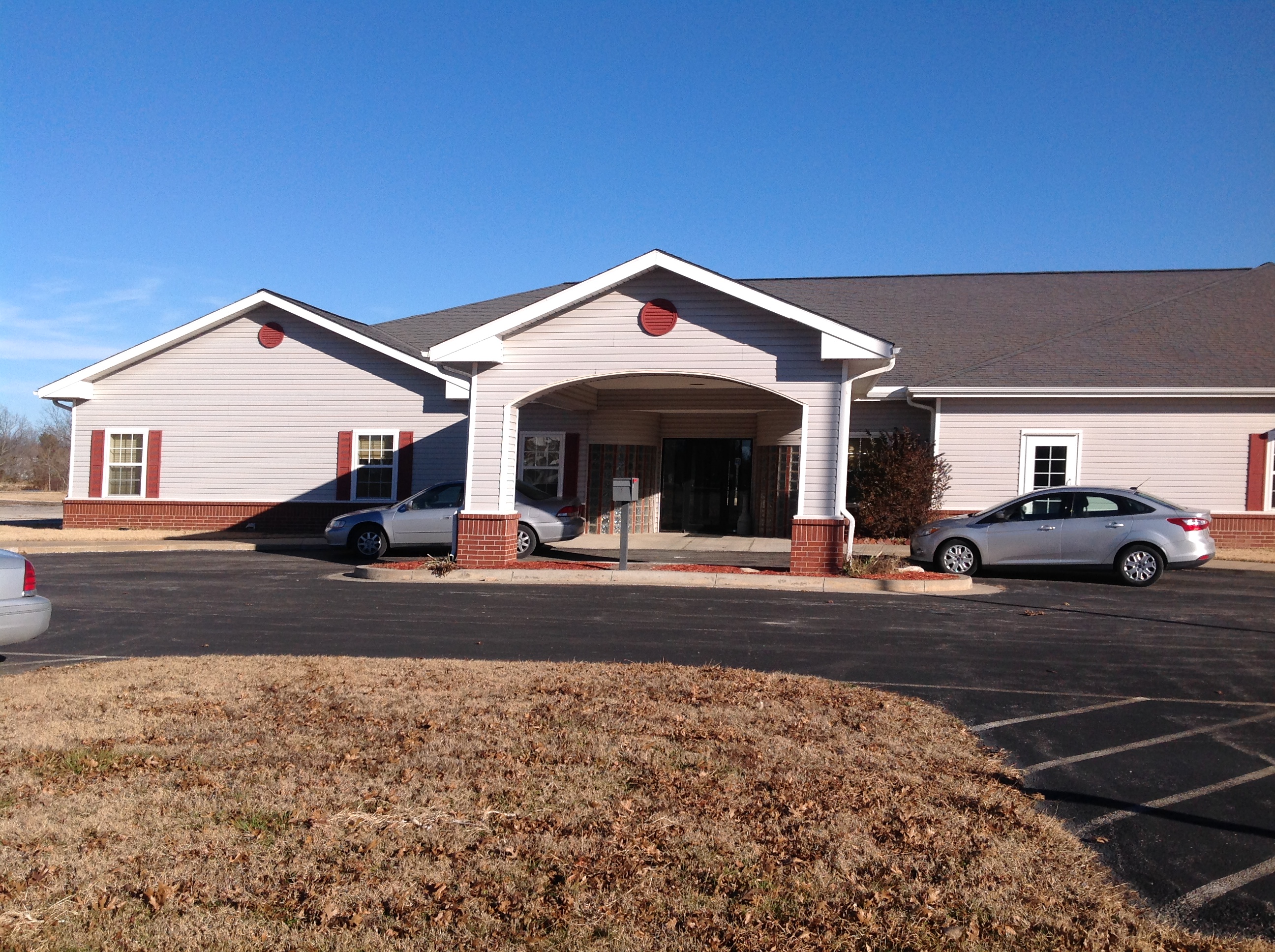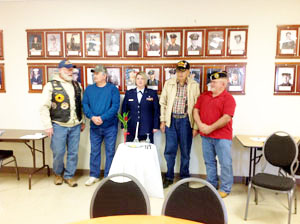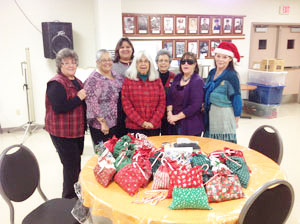Uncategorized
now browsing by category
Supervisor of Nutrition Program Retires This Month
After three years as supervisor of the Delaware Tribe’s Elder Nutrition Program, Judy Dull has announced that she will retire on May 23. Her sister,
Arleena Whittenburg, who volunteers at the program, will also hang up her apron on May 23. Explaining the journey to this point, Dull said, “We started here together when the Cherokee Nation ran the program.” When the previous supervisor was out for an extended period, Dull and her sister, who are Cherokee, began volunteering as a way of helping out. Later, when the supervisor learned that she could not return for an extended period of time, Dull decided to apply.
Since the program was administered by the Cherokee Nation, Dull went to Tahlequah to apply. She started the job in 2009 and worked in that capacity for two years. The Delaware Tribe applied and was awarded direct funding for the Nutrition Program in 2011. Dull reapplied and was hired. Since then, she has been working diligently to serve the elders who come to the program, Native Americans 55 years and older and their guests. When she started, the six-table dining room was in a smaller room now used as office space. Over the years, Dull has worked to double the number of tables, which now stands at 12, serving 45-50 seniors each day, Mon–Fri from noon-2:30 pm, she said.
Meals are planned a month in advance by Dull, who calls herself a “working supervisor,” helping out wherever she is needed. “I usually sit down and start with a pencil and I erase until we get what we want,” Dull said. Lunch usually consists of: an entrée, two sides, a salad/fruit bar, coffee/iced tea, milk or water, dessert and soft serve ice cream. Occasionally, a simpler menu of: soup/chili, sandwich and fruit, is offered. After lunch on movie day, popcorn and packaged snacks are available to attendees.
“One of the most favorite meals we do is the Indian taco,” Dull said. However, mindful of the needs of diabetics, she added, “we usually only have fry bread once a month.”
Another monthly tradition is birthdays. “We have cake, ice cream, balloons, hamburgers and fries. And we give them a birthday card with a Delaware dollar in it.” (This dollar, from the U.S. Mint, has the Delaware clans on one side depicting the Delaware symbols: the wolf, turkey and turtle.) The coin commemorates the historical event when the Delaware Tribe signed the first Indian treaty with the U.S. at Fort Pitt and approved by Congress on September 17, 1778.
“We do anniversaries the same way. Charles and Mary Randall do all of this work. They are elders who volunteer. They put up the birthday decorations and hand out the cards. Mary Randall usually does the cakes,” Dull ex-plained.
Looking forward, Dull expects some things will change and some things will remain the same at the Nutrition Program. The current staff of cook Archie Elvington and dish-washer Nancy Sumpter will remain.
“They may also hire a dietician under the new grant,” Dull explained.
In April, the Delaware Tribe’s senior nutrition pro-gram grant, written by Jenifer Pechonick, was renewed, assuring the program’s continuation for another three years.
Dull is grateful to the support she has received from the Delaware Tribe. “We have a good boss and we get along with the Chief. Jan Brown started this [program],” she said.
Born and raised in Bartlesville, the sisters grew up do-ing restaurant work starting at age 12. “We car hopped,” Whittenburg said.
Dull added, “I started out as a bus girl and then went to car hopping at Brooks Drive-in on old Hwy. 123 and then Walkers on Hwy. 123. Brooks had an inside dining room and a drive-in and was one of the finest dining places in those days.”
The sisters spoke highly of their parents, who raised five children and taught them good work ethics. Their father, who was Cherokee, had worked at National Zinc Company for many years, and their mother had worked weeknights for 32 years as a janitor for Phillips Petroleum.
“Our dad would take us to the movies on Friday nights while our mom was working. We saw Western serials,” Dull said reminiscing.
“Our mom worked Mon.–Fri. from 6 p.m.–2 a.m. cleaning offices at Phillips. Both of our parents worked very hard to provide for the family and to set an example for us,” Dull said. In addition to her job, their mother was an excellent homemaker.
“My mom always had a starched dress ready anytime my aunt picked us up to go out,” Dull said with pride. These high standards have served the sisters well over the years in all of the jobs they have held.
Reflecting on her favorite aspects of her job as supervi-sor of the Nutrition Program, Dull said, “being here is mainly about working with the older people out there and seeing them happy. That’s why I’m here—to see them happy.
“We celebrate all the holidays. At Easter we had an Easter egg hunt with jelly beans in them. Four of the eggs had $5 bills in them, so they were really scrounging to find them. We helped if they couldn’t bend down,” Dull said with a smile.
“I’ve been at some of the nutrition sites and this is one of the finest dining rooms I’ve seen. The atmosphere sets it apart–homey, like eating with family,” Dull said. Whittenburg chimed in, “We’re friendly with them. They look forward to the meal—to seeing their friends; and you know you eat better than you would eat at home.”
“We check to see if their dinners are okay or if they need anything. If they want a second helping, we don’t mind. That’s what makes it more like home.”
As this next chapter unfolds, Whittenburg says she plans to go fishing more often.
Dull is not certain what she’ll do with her free time, but she plans to spend it with her husband, who has also retired recently.
We thank them for their contribution in improving the lives of those they have served and invite them to stay in touch and visit often.
Delawares and Cherokees Reach Housing Agreement
Reprinted from Bartlesville Radio web page, Feb 26, 2014
www.bartlesvilleradio.com/pages/news/67442014/delawares-and-cherokees-reach-housing-agreement
The Delaware Tribe of Indians and the Cherokee Nation have signed an agreement allowing the Delaware to seek and receive federal housing funding directly from the U.S. Housing and Urban Development.
According to Delaware Chief Paula Pechonick, the Delaware Tribe is pleased to accomplish another step toward self-determination as a federally recognized tribe. She says members are grateful that negotiations with Chief Baker’s administration have resulted in this implementation agreement. Pechonick says the Delaware Tribe is moving forward with its restored status as a HUD grantee to provide clean, safe and affordable housing for tribal members. Pechonick also recognizes the continuing relationship with the Cherokee Nation to address the many unmet housing needs not provided by this agreement.
The Delaware Tribe is headquartered in Bartlesville. It was placed in the Cherokee Nation jurisdiction in 1867 by treaty. The two tribes signed a memorandum of agreement in 2008 to enable the Delaware to regain its federal recognition.
Cherokee Nation Secretary of State Chuck Hoskin, Jr. says it is a good day for both the Cherokee Nation and the Delaware Tribe because the new agreement allows their Delaware brothers and sisters to return to the table and negotiate and deal with the federal government directly. Hoskin says he is pleased to have played a necessary role as the intermediary, but even more pleased the Delaware will be able to pursue its own self-determination and governance by securing funding directly from the federal government.
Delaware Tribe Historic Preservation Office
Gregory Brown and Brice Obermeyer
This has been an incredibly busy and exciting three months in the Historic Preservation department, as a number of projects begin to wind toward their partial conclusion and others begin in earnest.
NAGPRA Work, Cultural Affiliation
We continue to work on “cultural affiliation” studies for two major sites, described last year in the January and April issues of the DIN. These affiliation studies, funded by a grant from the National NAGPRA office in Washington DC, will allow us to begin to repatriate over 200 individuals
from the Chambers site in western Pennsylvania, occupied in the period between about 1760 and 1775, and the Abbott Farm site near Trenton, NJ, a site
occupied and heavily used for several thousand years and one of the most important archaeological sites on the East Coast.
The final draft of our Chambers affiliation report has been completed, finally, and is being shared with other federally-recognized tribes who may have been present on and around the site (including Wyandots, Hurons, Miamis, Senecas, Shawnees, and others) and with the two museums that now have
the remains. Work on the Abbott Farm site, which is spread between at least five different museums, will continue through the summer.
Expansion of Consultation Program
A new federal program called “Positive Train Control” will cause a large upsurge in tribal consultation nationwide, and we are expanding our program
to accommodate it. Our Historic Preservation Office for several years has responded to requests from agencies and developers to review their projects for possible impacts to archaeological resources in lands where the tribe was present, now and in the past (in our case parts of no less than 14 states!). These are often abbreviated Section 106 requests, since they involve provisions of Section 106 of the National Historic Preservation Act (NHPA).
The Positive Train Control program mandates railroad companies nationwide to construct new cell towers every two miles (within the next 18 months or
so) as a measure to technologically control their trains, resulting in a huge uptick in cell tower construction and, accompanying that, many more Section 106 requests to handle. This program, which provides income for the tribe in the form of consultation fees, will add to the already very active program of Section 106 requests from other sources.
To handle this increasing load, we are excited to introduce two new part-time members of the DTHPO staff, both based at Temple University in Philadelphia. Blair Fink and Susan Bachor are Ph.D. students in the Anthropology Department at Temple, working under our colleague Dr. Michael Stewart, and are experts in the archaeology of the Delaware River Valley, original homeland of the Lenape people. They will handle consulting requests from the East Coast, and their physical presence near records repositories and the sites themselves is one of many reasons we are excited to finally have a presence on the East Coast.
Other DTHPO Activities
We have worked with the Haudenosaunee Standing Committee on a project in the town of Otsiningo, NY, where a burial was inadvertently discovered,
successfully allowing the burial to remain undisturbed. In collaboration with the St. Regis Mohawk, we are consulting on the mitigation efforts at a multicomponent archaeological site at Million Dollar Beach Site near Fort William Henry, NY, eligible for listing on the National Register of Historic Places; and in collaboration with the St. Regis Mohawk and Stockbridge Munsee we are consulting on the planned mitigation of the impact
of Exit 3.4 to an archaeological site in Albany, NY.
Brice Obermeyer has presented several talks of the history of the Kansas Delawares (“Talk by the Stove” at the Grinter House, Kansas City, KS on January 11, and a taped interview for National Public Radio on February 13). He also consulted with the Ohio Historical Society on their interpretive plan. Greg Brown, Cultural Resource Department Director Anita Mathis, Language Program Director Jim Rementer, and Tribal Manager Curtis Zunigha
consulted with historians from the National Museum of the American Indian on a proposed exhibit (see elsewhere in this issue), and Brice Obermeyer
and Greg Brown just returned from a trip to the Middle Atlantic Archaeological Conference near Philadelphia, where we consulted on several NAGPRA
and Section 106 projects.
Blair Fink and Susan Bachor. Welcome to our tribal community.
New Lenape Language Classes Offered on Bartlesville Campus

Due to popular demand, the Culture Preservation Committee has decided to begin a new session of Lenape language classes. The new classes will be held at the Delaware Tribal Community Center in Bartlesville, Oklahoma. Classes will be on the second, third, and fourth Monday of each month beginning at 6 PM. The class sessions will last about an hour or so and the students will be given a printed lesson to study and keep.
If you are interested in attending the classes, please contact Jim Rementer at LenapeMail@aol.com. Include your name, telephone number, and email address. We need these so you can be contacted if there is a last-minute change in class scheduling.
The classes are sponsored by the Delaware Tribal Culture Preservation Committee, and there is no charge for attending. The instructor for the class will be Jim Rementer, and assistant instructor is Janifer Brown. They have both worked for a number of years with our last fluent speakers in an effort to record and preserve the language.
The Lenape language was originally spoken in the old homeland which was all of the state of New Jersey, northern Delaware, eastern Pennsylvania, and southeastern New York.
2014 Tribal Council Meeting Schedule
At the January 7, 2014 Tribal Council meeting, the members voted to host Tribal Council meetings at the Caney, KS headquarters once per quarter. Since the January meeting was postponed due to inclement weather, they agreed to conduct the February meeting in Caney.
Following is the approved 2014 Tribal Council meeting schedule: Meeting start time will be following the Trust Board meeting.
| February 3 | Caney, KS headquarters; Tribal Court Room (due to postponing it in January) | March 3 | Bartlesville, OK headquarters; Forsythe Community Center | April 7 | Caney, KS headquarters; Tribal Court Room | May 5 | Bartlesville, OK headquarters; Forsythe Community Center | June 2 | Bartlesville, OK headquarters; Forsythe Community Center | July 7 | Caney, KS headquarters; Tribal Court Room | August 4 | Bartlesville, OK headquarters; Forsythe Community Center | September 2 | Bartlesville, OK headquarters; Forsythe Community Center (this is a Tuesday meeting due to the Labor Day holiday) | October 6 | Caney, KS headquarters; Tribal Court Room | November 3 | Bartlesville, OK headquarters; Forsythe Community Center | December 1 | Bartlesville, OK headquarters; Forsythe Community Center |
Note: Meeting date/location subject to change without notice
Meet the Child Support Services Department



 |
 |
| Veterans at Veteran’s Day celebration in Delaware Community Center on November 8, 2013 | Delaware War Mothers fill Christmas “goodie bags” for our veterans. L-R, Barbara Wallace, Laura Maynor, Tonya Anna, Mary Watters, Pat Donnell, Cy Hughes, Chief Paula Pechonick. |
Ball State University Produces Film on Delawares in Indiana
 |
 |
| Veterans at Veteran’s Day celebration in Delaware Community Center on November 8, 2013 | Delaware War Mothers fill Christmas “goodie bags” for our veterans. L-R, Barbara Wallace, Laura Maynor, Tonya Anna, Mary Watters, Pat Donnell, Cy Hughes, Chief Paula Pechonick. |
Learn Your Lenape!
Lenape Tahkokën (Fall) Poem
Mèchi tahkokënëmihëna,
We are already experiencing Autumn,
Ok yukwe thapànëmihëna,
And now we are having cool weather,
Alëmi xu pënipahikëleyok,
The leaves will begin to fall from the trees,
Xuniti nànkahchuwàk Lënapeyok.
Soon the Delawares will shiver from the cold.
Winter Poem
Yukwe mèchi luwànëmihëna,
Now we are experiencing winter,
Ok yukwe nkàski athiluhehëna.
And now we can tell the wintertime stories.
Wàni Lënape xu tupànuxweyok,
The Delawares will walk in the frost,
Ok xuniti nèki Chëlilisàk ktëkiyok.
And soon the Snowbirds (Juncos) will return.
















































































 D5 Creation
D5 Creation